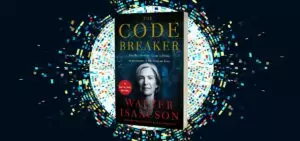I love science fiction. My first science-fiction novel was Ray Bradbury’s “451 Fahrenheit,” and it is still one of my favorites. I started with the classics: Isaac Asimov, Arthur Clarke, Philip K. Dick, Ursula Le Guin–and gradually moved to modern authors such as Ted Chiang or Max Brooks.

✅ AI Essay Writer ✅ AI Detector ✅ Plagchecker ✅ Paraphraser
✅ Summarizer ✅ Citation Generator
I am also a big fan of cyberpunk culture in fiction literature. “High tech–low life”: this credo perfectly describes the whole concept of cyberpunk literature and cinematography and, in my opinion, reflects some of the aspects of the world we live in today. Huge omnipresent corporations monitoring every aspect of citizens lives; artificial intelligence; implants and augmentations merging humans with machines; virtual reality; crime and corruption–these are the topics discussed and described in cyberpunk fiction.
And, if you think a little bit, you can draw parallels between literature and reality. For example, it is not a secret that Apple and Google collect personal data and analyze behavioral habits of their users. Initiatives such as Elon Musk’s Neuralink are aimed at searching for new ways of interaction between the mind and technology. Google’s work on neural networks; gear for interacting with virtual reality manufactured by HTC, Samsung, and other tech giants; Ray Kurzweil’s predictions on the singularity (the merging of human flesh and nanotechnologies)–these are just some of the examples proving that the world we live in nowadays is already “cyberpunkish” in many ways.
So, as a big fan of cyberpunk, I wonder how I managed to miss out on William Gibson’s novels for my entire life. Before I came across his “Neuromancer,” the icon of the genre to me was “Do Androids Dream of Electric Sheep?” by Philip K. Dick. However, from the first lines of “Neuromancer” I realized: this is a book I am going to love wholeheartedly. Consider this review biased.
Oh yes, spoilers ahead.
Case, on whose behalf the story is told, is an unprincipled former hacker living in the Japanese city of Chiba, trying to make a living after his neural system was damaged. In the world Gibson paints, to hack into databases and computer systems, a hacker has to directly wire themselves into cyberspace via decks. Decks, in their turn, are wired to a hacker’s neural system. So, since Case is damaged, he has to earn money for food and drugs in other ways–hired assassination, for example. One day, Case meets Molly Millions, an assassin working for a shady person named Armitage. Armitage promises to have Case’s neural system restored in exchange for a series of jobs done. As hacking is all Case lives for, he agrees to help.
It turns out that Armitage works for Wintermute–a part of artificial intelligence (some sort of a sub-personality) seeking to become whole. Turing Police governing questions related to artificial intelligence forbids creating full-scale AIs, so they must be divided into several subsystems with different physical mainframes. The other part Wintermute seeks to reunite with is called the Neuromancer. Unable to merge on their own because of program limitations, the two AIs need help–this is why they hire Armitage, Case, and Molly.
After a series of adventures, the trio arrives to Freeside—an orbital station on which a family residence of Tessier-Ashpool industrial clan is located. The Tessier-Ashpool family is the one standing behind the creation of Wintermute and Neuromancer. The CEO of the family corporation, Lady 3Jane, holds a password necessary for completing the job. Learning the password becomes the final task for Case and Molly.
What I liked the most is that “Neuromancer” does not try to feed you with v-means-vendetta-robin-hood-against-the-system nonsense. The world Gibson describes is dark, corrupt, and lawless–so why would the main characters be any different? Case is a drug addict and an assassin incapable of normal human feelings. His main reason for doing the job is his own wellbeing (and life, actually, after Armitage injects him with slowly dissolving capsules containing dangerous toxin). Molly is a “street samurai,” a mercenary capable of doing any kind of dirty work. Armitage is a former soldier whose personality Wintermute had to reconstruct from scratch, as he suffered from severe PTSD. Together, the trio form a team of outlaws not caring about the outcomes of what they do, interested only in money and the job itself. Such characters fit the story perfectly. I cannot imagine a classic “knight in shining armor” type of character surviving on the streets of Chiba City, not to mention working for someone.
I liked the dense and desperate mood of the world created by William Gibson. This world is always dark, gloomy, and filled with nervous neon lights, people high on exotic drugs and clenched in corporate fists (one of the strongest scenes in the book, in my opinion, is a brief description of a salaryman with a corporate tattoo, meaning that his life and death belong to the corporation he works for). This world is full of technological wonders: cyberspace, cloning, virtual reality, reconstructed personalities of people long dead, cosmetic surgery, cybernetic prosthesis and augmentations, and many others. This world is run by primordial laws, so only the strongest survive in it. “Neuromancer” is not a long novel, but the intensity of the atmosphere pumped through its pages is enormous.
I also liked the writing style. It was a bit difficult to read: Gibson constantly uses slang, the professional jargon of hackers, criminals, and other scum living in his world. The very structure of the narrative is somewhat tattered, sometimes even disconnected. But once you get used to it, “Neuromancer” will not let you go unless you finish reading to its last page.
I cannot name a single aspect I disliked. The love story between Case and Molly seemed a bit forced, and sometimes it felt like the concentration of “cyberpunkish” details was too high–but that is it. Overall, “Neuromancer” is a great novel that I would recommend anyone to read.
Follow us on Reddit for more insights and updates.





Comments (0)
Welcome to A*Help comments!
We’re all about debate and discussion at A*Help.
We value the diverse opinions of users, so you may find points of view that you don’t agree with. And that’s cool. However, there are certain things we’re not OK with: attempts to manipulate our data in any way, for example, or the posting of discriminative, offensive, hateful, or disparaging material.